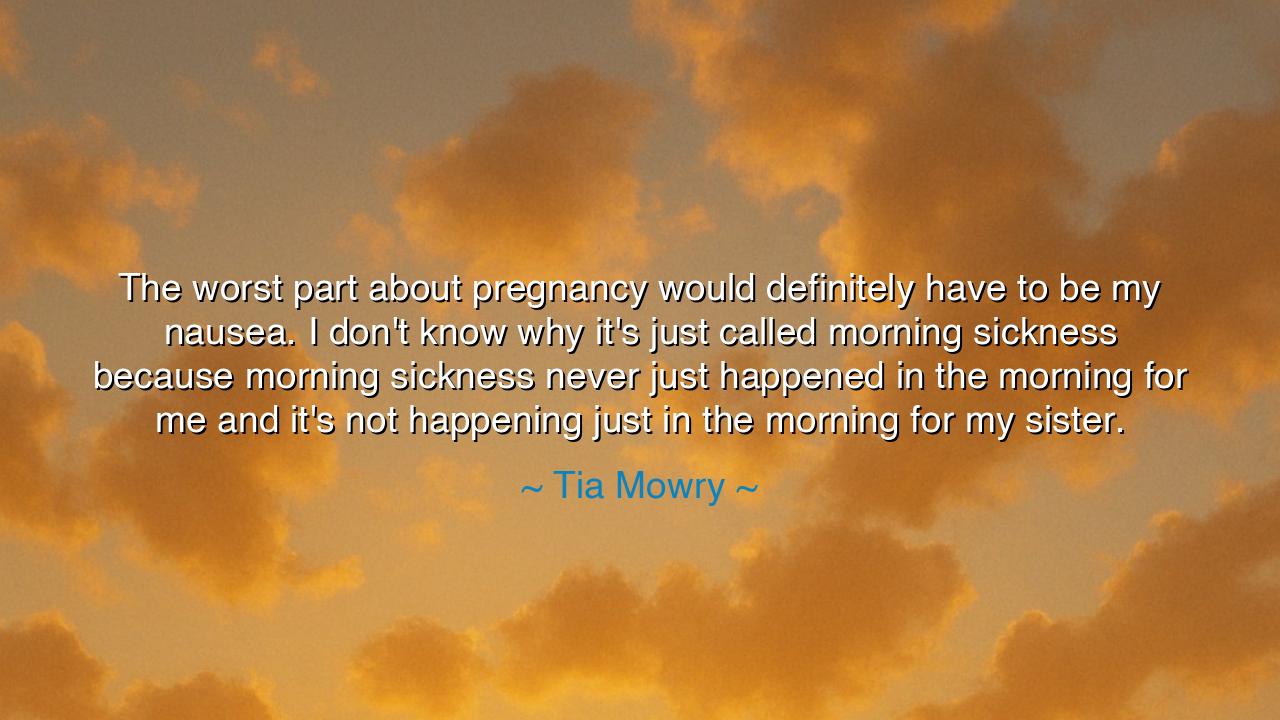
The worst part about pregnancy would definitely have to be my
The worst part about pregnancy would definitely have to be my nausea. I don't know why it's just called morning sickness because morning sickness never just happened in the morning for me and it's not happening just in the morning for my sister.






Tia Mowry once spoke with candor about the trials of motherhood: “The worst part about pregnancy would definitely have to be my nausea. I don’t know why it’s just called morning sickness because morning sickness never just happened in the morning for me and it’s not happening just in the morning for my sister.” These words, though born from the intimate reality of her own body, carry a resonance that extends far beyond her personal story. They speak to the hidden burdens women have carried since the dawn of time, and the courage required to endure them.
At the heart of her words lies the tension between name and reality. The term morning sickness suggests a confined struggle, one bounded by the hours after dawn. Yet the truth, as Mowry reveals, is harsher: for many women, nausea lingers all day and all night, unrelenting and invisible to those who do not walk the same path. Her complaint is not only physical but symbolic, reminding us how often society names things too simply, masking the full weight of the suffering they represent.
This is not a new story. Ancient women, too, bore the pains of pregnancy largely in silence, their struggles wrapped in the mystery of creation. In Greek mythology, even goddesses endured the trials of childbirth—Leto, giving birth to Apollo and Artemis, was said to have wandered in agony until she found a place of refuge. These stories remind us that even in the realm of the divine, bringing life into the world was seen as both sacred and punishing, a burden wrapped in glory.
History also shows us how societies often misunderstood or minimized the experiences of women. For centuries, physicians dismissed women’s voices about the intensity of their symptoms, reducing them to neat labels like “morning sickness,” as though discomfort could be ordered neatly within hours of a clock. Mowry’s correction is thus both personal and universal: a declaration that women’s lived realities defy simple categories and deserve to be acknowledged fully.
Yet in her humor and honesty, there is also resilience. To speak openly about nausea, discomfort, and struggle is to strip away shame and offer solidarity. By mentioning not only herself but also her sister, Mowry broadens her story into the shared experience of countless women. This is how suffering is transformed: not by erasing it, but by voicing it, by showing others that they are not alone in their trials.
The deeper meaning of her reflection is that hardship, even when mundane or physical, can carry dignity when it is faced with courage. The trials of pregnancy are not only about nausea or fatigue—they are about the quiet heroism of carrying life, of enduring weakness for the sake of strength yet to come. What seems to be only pain is also sacrifice, and what seems to be only suffering is also love in its rawest form.
Therefore, let us learn from Tia Mowry’s words: do not dismiss the struggles of others with names that are too simple, nor assume that burdens are lighter than they appear. Acknowledge the unseen battles, honor the silent strength, and offer compassion where there is pain. For when we recognize the fullness of another’s hardship, we give them not only sympathy but also dignity. And in doing so, we learn to see that even in the trials of nausea and morning sickness, there is the heroic story of life itself being written.






AAdministratorAdministrator
Welcome, honored guests. Please leave a comment, we will respond soon